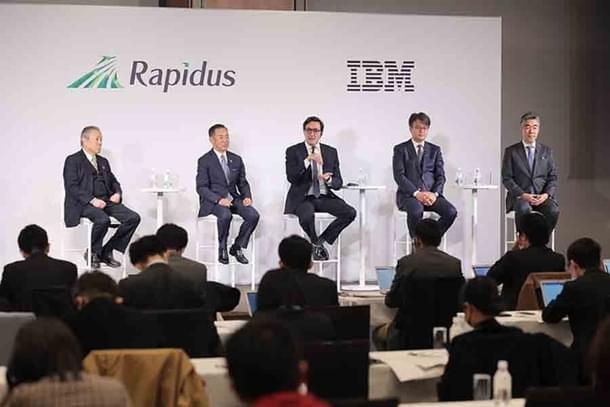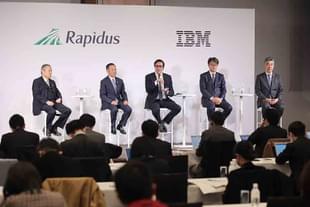Tech
GlobalFoundries Files Lawsuit Against IBM For Illegal IP Disclosures To Rapidus, A State-Backed Firm That Japan Is Counting On To Win 2nm Chip Race
Swarajya Staff
Apr 26, 2023, 09:29 AM | Updated Apr 27, 2023, 02:40 PM IST
Save & read from anywhere!
Bookmark stories for easy access on any device or the Swarajya app.


Leading semiconductor chip manufacturer GlobalFoundries (GF) announced last week that it had filed a lawsuit against International Business Machines (IBM), accusing it of unlawfully sharing confidential intellectual property(IP) and trade secrets.
In the legal action filed in a New York court, GF accused IBM of unlawfully disclosing its IP and trade secrets to IBM partners, including Intel and Japan's Rapidus, a new state-supported semiconductor consortium that IBM is partnering with to develop cutting-edge 2-nanometer(nm) chips.
"IBM is unjustly receiving potentially hundreds of millions of dollars in licensing income and other benefits," GlobalFoundries said in a statement.
GF'S complaint noted that IBM's Rapidus partnerships involves deploying technology derived from collaborative research conducted jointly by IBM and GF at the Albany NanoTech Complex.
Located at SUNY Poly's College of Nanoscale Science and Engineering, Albany NanoTech Complex is a fully-integrated research, development, prototyping, and educational facility established in partnership with IBM, GlobalFoundries, Samsung, Applied Materials, Tokyo Electron, ASML and Lam Research,
GF also accused IBM of poaching its top engineering talent from the company's manufacturing facility, which is located near the Albany NanoTech Complex.
At the centre of GF's lawsuit is IBM's partnership with Rapidus
In December 2022, Rapidus signed a chip licensing partnership with IBM Research to develop IBM's 2-nanometer(nm) technology in fabs that Rapidus will build in Japan. The 2-nm structures will be fabricated by Rapidus using ASML's EUV manufacturing equipment.
In May 2021, IBM announced the world's first 2nm test chip. which the company claimed will achieve 45% better performance or 75% more energy efficiency than leading 7 nm chips.
Rapidus was started in 2008 by semiconductor veterans, including Atsuyoshi Koike (who was previously heading memory chip maker Western Digital Japan), with $510 million in subsidies from the Japanese government along with contributions from Toyota, Sony, Kioxia, NEC, NTT, Softbank and Denso with each company putting in $6.8 million.
Tetsuro Higashi, former president of chipmaking equipment supplier Tokyo Electron, serves as chairman of Rapidus.
Rapidus will build a state-of-the-art semiconductor manufacturing plant in Hokkaido in northern Japan as it seeks to begin mass production of chips with state-of-the-art 2-nm technology in five years. It will announced plans to spend $37 billion, including research and development, to launch mass production of 2-nm chips.
Rapidus is viewed as pivotal to Japan's all-out strategy to regain chipmaking glory by luring overseas and local semiconductor companies by designing generous financial incentives.
Besides funding Rapidus, Japan is providing up to $3.56 billion in subsidies for a new TSMC factory in Kumamoto, on the southernmost main Japanese island of Kyushu, that is set to begin operations in 2024.
Japan is also providing incentives to Kioxia and Micron Technology to build plants in Japan that manufacture semiconductors needed for data centres, artificial intelligence and other cutting-edge technologies.
Japan lags behind South Korea and Taiwan in advanced chip manufacturing. It imports more than 60% of its semiconductors, much of them from Taiwan and China.
The 10-nm chips that drive smartphones are dominated by chip manufacturers from Taiwan and South Korea, while 28nm technology used in automobiles is mostly produced in Taiwan and China.
Local Japanese player Renesas Electronics can mass-produce only up to 40nm chips domestically.
Japan's share of global semiconductor sales plummeted to just 10% in 2019, down from 50% in 1988. The country still has 84 chip factories, the most in the world, but they're not producing enough high-end products. As a result, Japan now has to import 64% of its semiconductors.
NEC, Toshiba and Hitachi were widely regarded as pioneers in the semiconductor industry during the 1980s and 1990s. But this began to change in the 2000s as chip design became uncoupled from manufacturing, leading to the rise of contract foundries like TSMC.
GlobalFoundries
GlobalFoundries(GF) was formed in 2009 when AMD decided to go fabless and spun off its foundry as a separate entity.
GF later acquired Chartered Semiconductors and also two fabs from IBM in 2015. It later sold one of its fabs acquired from IBM to ON Semiconductors.
During the period 2015-2018, GF was second to TSMC in foundry business with about 10% market share, but soon Samsung overtook, and recently UMC seems to have overtaken as well, and GF is at 4th position with about 7% market share.
GF has fabs in the U.S (300mm fab with up to 12nm technology in Malta and 200mm fab running 90nm to 350nm technology, mostly Analog in Burlington), Germany (300mm fab with 22nm technology in Dresden) and Singapore (300mm fab up to 28nm technology and 200mm fabs with mature nodes).
GF also has an office in Bengaluru, India, from where it supports IT, fab operations, design to mask, as well as characterisation and modelling.
GF is owned by Abu Dhabi's Mubadala group.





